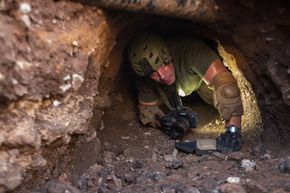What Is the U.S. Customs Service, and How Long Has It Been Around?
On July 4, 1789, the First Congress passed, and President George Washington signed into law, the Tariff Act of 1789. This act authorized the collection of duties, or fees, on imported goods. (The act was proposed as a measure to raise money for the financially desperate young nation.) Points of entry were determined shortly after, and people -- citizens and visitors -- entering the U.S. began to be accountable for what they brought with them [source: Malloy].
For more than a century, U.S. Customs supported virtually the entire government and its infrastructure, according to Customs Service historians. Customs revenues were used to build Washington, D.C., many of the nation's lighthouses, and the U.S. military and naval academies.
Advertisement
The U.S. Customs Service, whose early activities were far-reaching and diverse, spawned other government agencies, including the Bureau of Census, the Department of Veterans Affairs, the U.S. Coast Guard and the National Institute of Standards and Technology.
In March of 2003, the U.S. Customs Service (along with employees from other organizations like the U.S. Border Patrol) became U.S. Customs and Border Protection, an agency of the Department of Homeland Security. With that update, the CPB became responsible for ensuring that all imports and exports are legal and comply with U.S. laws and regulations, and for collecting revenues associated with the enforcement of those laws. (Zachary Mann, a 13-year special agent and spokesman for the U.S. Customs Service, likes to describe the agency as the "oldest law enforcement agency" in the U.S.)
The agency also takes charge of the following activities [source: Wallechinsky]:
- Seizing contraband, including illegal drugs and narcotics, and arresting people engaged in smuggling or other fraudulent behavior with the intent to get around customs laws
- Processing people, luggage, cargo and mail
- Protecting U.S. business and intellectual property rights by enforcing laws aimed at preventing illegal trade practices
- Protecting the "general welfare and security" of the U.S. by enforcing import and export prohibitions and restrictions, including money laundering and the export of data essential to the production of mass weapons of warfare
- Gathering import and export data for the purpose of compiling international trade statistics
- Enforcing hundreds of laws -- many related to quality of life issues, such as pollution and health -- for approximately 40 other agencies
